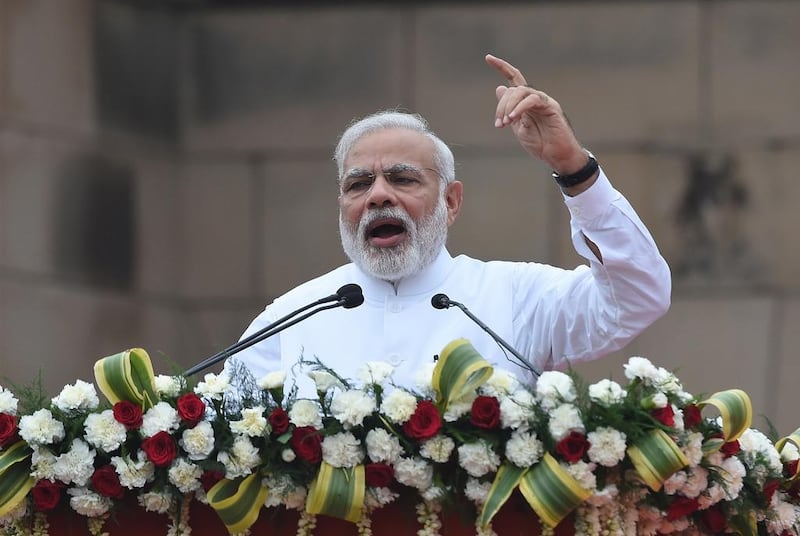As would be expected, Indian prime minister Narendra Modi is under growing domestic pressure to launch a military response against suspected terrorist training camps inside Pakistan after militants killed 18 Indian soldiers in disputed Kashmir. Last Sunday’s predawn raid on an army camp in the Kashmiri town of Uri was the worst attack against the Indian army in the restive region in years.
The Modi government has been quite measured in its responses to Pakistani provocations, including the terror strike at the Indian air force base at Pathankot in January. But there are signs that India is losing patience and there is a push for retaliation to avoid a domestic backlash. Mr Modi has been reviewing the government’s options, after tweeting on Sunday “those behind this despicable attack will not go unpunished”.
India’s typical response to what it deems a terrorist event follows a predictable pattern: the government pledges to bring the perpetrators to justice while the opposition denounces the government’s counterterrorism policy without offering any constructive solutions itself. Meanwhile, media coverage surges for a few days, but soon reverts back to discussions about Bollywood stars’ latest foibles.
India faces a structural problem given its location in one of the world’s most dangerous neighbourhoods – South Asia, which is now the epicentre of Islamist radicalism. India’s neighbours harbour terrorist networks and use them as instruments of state policy. The tribal areas along the Pakistan-Afghanistan border, which have long been outside the realm of effective control, have become a breeding ground for Islamist radicals. And now the rise of ISIL is rapidly changing the dimensions of global terror.
India began dealing with the threat of terrorism long before it reached western shores. The terror saga in the state of Jammu and Kashmir is more than three decades old. But until September 11, the West viewed the Kashmir problem through the lens of India’s inability to improve its human rights record.
The threat spiked in the early 1990s. Mumbai witnessed several terror strikes in 1993 and then, in November 2008, jihadists, aided and abetted by Pakistan’s Directorate for Inter-Services Intelligence, openly confronted the might of the Indian state under the full glare of the global media. In the wake of the November 2008 terrorist attacks in Mumbai, the Indian government took some initial steps toward a more robust counterterrorism policy. But even since then, deadly attacks on high-value targets in India have continued.
Institutionally, India remains a poor performer with no lessons learnt despite many tragedies. India’s intelligence coordination and assessment apparatus is not suited to the changing nature of the terrorist threat facing the nation. Despite the horrendous attacks on Mumbai in November 2008, it took the government nearly three years to approve the proposal for a National Intelligence Grid, a facility to improve coordination among government agencies to fight terrorism. The other major proposal – to create a national centre for counterterrorism – is yet to become fully realised. The government did set up the National Investigation Agency, modelled on the FBI, to improve intelligence gathering and sharing, but it remains underfunded. None of the terror investigations in recent years have yet reached conclusion.
Rather than improving grass roots capabilities to effectively counter terrorism, the government has gone for these grand initiatives. Police modernisation is lagging; the police forces – the frontline agencies in dealing with the threat of terrorism – remain underfunded and ill-trained.
National security issues should transcend politics, but the lack of civil dialogue among the political parties in India is an abomination. The nation needs a political environment in which parties can see beyond their immediate electoral gains and losses. Terrorist organisations appear to be able to strike at will, demoralising an entire nation even as the government continues to rely on symbolism to deal with terrorism. In this day and age, no government can provide its citizens with a foolproof guarantee against terrorism. But in India, citizens continue to suffer about 700 terror attacks every year without any accountability. This will have to change if India wants to be taken seriously as a global power to be reckoned with.
The focus should be on building credible military options for retaliation so that a robust counterterror policy can be put in place. Hyperventilation over the Uri attack won’t really help. The country must first be made ready for potentially tough decisions and their consequences. And Indians will have to bring their ends, ways and means into balance so that a coherent strategy can be developed. It is a process that takes time.
The latest attack also underscores the growing concern in Islamabad that New Delhi’s strategy of diplomatically isolating Pakistan and focusing on Baluchistan is actually working. And at a time when Pakistan prime minister Nawaz Sharif wants to rake up Kashmir at the international level, the Uri terror strike might also further isolate Pakistan.
Indians need to recognise that every attack is not a sign of success and restraint is not always a sign of failure. Indian diplomatic strategy vis-à-vis Pakistan is working; the country now needs to sharpen its military teeth further.
Harsh V Pant is a distinguished fellow and head of strategic studies programme at the Observer Research Foundation, New Delhi and professor of international relations at King’s College London





